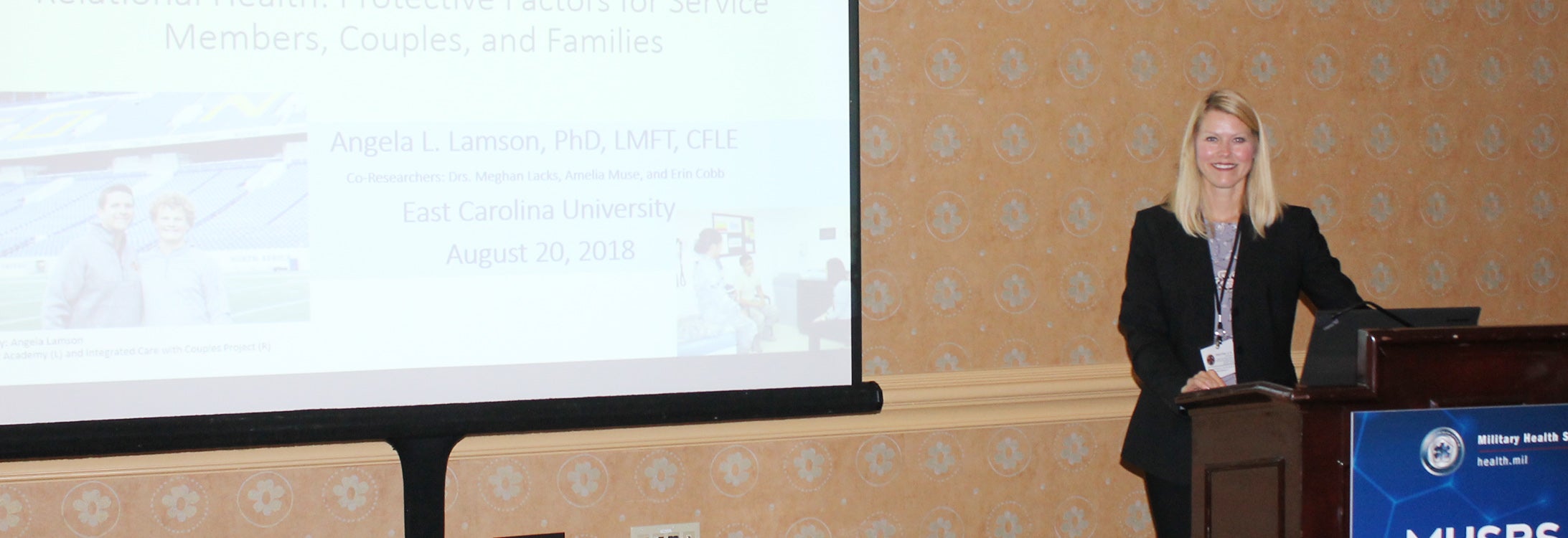Researcher focuses on military health
East Carolina University’s Angela Lamson recently spent a weekend at the U.S. Department of Defense’s premier scientific meeting, sharing her research with military leaders in the area of integrated health care and the holistic health of military couples.
Lamson, who serves as the associate dean for research in the College of Health and Human Performance, was selected as one of the first ever presenters on military family readiness at the 2018 Military Health System Research Symposium. Her research with military populations has spanned over a decade and included many doctoral and masters level students as collaborators.

Angela Lamson, associate dean for reseasch in East Carolina University’s College of Health and Human Performance, shares her presentation on military family readiness at the 2018 Military Health System Research Symposium. (Contributed photos)
Her work has the potential to not only influence how military service members are treated physically, psychologically, socially and spiritually, but provides an integrated health care model that’s applicable to civilian clinicians and patients, who want to put a greater emphasis on the overall health of individuals and families.
“The major point I tried to stress was that your emotional, social and spiritual health are just as important as your physical health,” Lamson said. “We’re showing that a whole-health approach provides benefits to service members and their partners or families.”
Lamson’s research approach takes a look at military service members’ complete health care needs. In the past, research has often focused on the biomedical needs of service members, including physical ailments like muscle and joint injuries. Lamson’s work uses a biopsychosocial-spiritual model that not only assesses a service member’s physical health, but their mental and emotional health as well.
Lamson said that she and her colleague, Meghan Lacks, saw an absence of research involving two populations in the military – dual military couples where both partners are serving in active duty simultaneously and active duty women – that could especially benefit from this model of care. Lamson also partnered with co-researchers Amelia Muse and Erin Cobb.

ECU’s Angela Lamson was one of 10 researchers asked to present on military families at the 2018 Military Health System Research Symposium.
“We want to help create and sustain a health care model so that when military personnel and their families see their primary care providers, they feel as though their behavioral health care is just as important as their physical health care,” Lamson said.
This type of care may include protocols, assessments and behavioral health providers trained in integrated care models that address depression, anxiety, trauma, social and spiritual health.
Lamson’s background in medical family therapy led to an interest in military health with individuals, couples, families and military health care providers. She said that over her career, she’s seen a positive correlation between family support and successful health care outcomes.
“Sometimes military personnel may worry about the stigma that comes with seeking mental health care because their job is to be mission ready,” she said. “When we use an integrated health care model, mental health and physical health are seen as co-equals. Clinicians then provide more preventative health care measures throughout every health care visit so that we identify and hopefully prevent problems before they reach a level of concern.”
Lamson said she was moved by the response to her work by those attending the symposium.
“The symposium was eye opening,” she said. “I had participants tell me that ‘no one is talking about this type of care. You’re doing work that no one at this conference has focused on before.’”
Lamson’s work with the Department of Defense began in 2009. After working closely with colleagues across many bases in North Carolina, Lamson submitted a research proposal in partnership with Operation Reentry North Carolina. Over her career, Lamson has secured $117,000 in funding from the Department of Defense and over $3 million in grants related to integrated behavioral health care.
“I’ve been able to realize that this type of research is how I can give back to those who serve our country,” Lamson said. “Research into how we care for our military members can make a huge difference in their lives and in the lives of civilians. There is plenty of work to be done; I’m going to keep moving forward and am excited for future possibilities with researchers who are passionate about strengthening the health of military members and their families.”
-by Matt Smith, University Communications